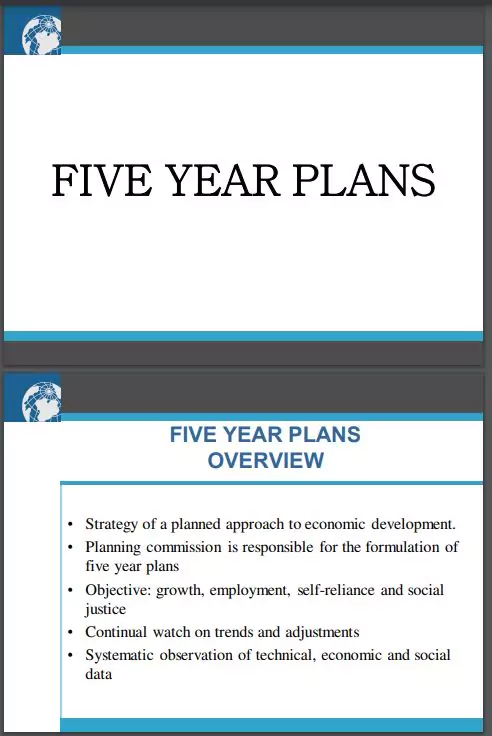‘List of All Five Year Plans With Objectives’ PDF Quick download link is given at the bottom of this article. You can see the PDF demo, size of the PDF, page numbers, and direct download Free PDF of ‘Five Year Plans of India’ using the download button.
List of All Five-Year Plans With Objectives PDF Free Download

List of Five-Year Plans in India [1951-2017]
Five-Year Plans (FYPs) are centralized and integrated national economic programs. Joseph Stalin implemented the first five-year plan in the Soviet Union in 1928. Most communist states and many capitalist countries later adopted them.
China has continued to use FYPs, although from 2006 to 2010 China renamed its eleventh FYP a guideline (guihua) rather than a plan (jihua) to reflect the central government’s more pragmatic approach to development.
India launched its first FYP in 1951, soon after independence, under the socialist influence of India’s first Prime Minister, Jawaharlal Nehru.
| Five Year Plans | Years | Assessment | Objective |
| First Five year Plan | 1951- 1956 | Targets and objectives more or less achieved. With an active role of the state in all economic sectors. Five Indian Institutes of Technology (IITs) were started as major technical institutions. | Second Five-year Plan |
| ‘Growth with stability and progressive achievement of self-reliance Garibi HataoTarget: 5.5 pc | 1956-1961 | It could not be implemented fully due to the shortage of foreign exchange. Targets had to be pruned. Yet, Hydroelectric power projects and five steel mills at Bhilai, Durgapur, and Rourkela were established. | ‘establishment of a self-reliant and self-generating economy |
| Third Five year Plan | 1961-1966 | Failure. Wars and droughts. Yet, Panchayat elections were started.• State electricity boards and state secondary education boards were formed. | A new agricultural strategy was implemented. It involved the distribution of high-yielding varieties of seeds, extensive use of fertilizers, exploitation of irrigation potential, and soil conservation measures. |
| Plan Holidays – Annual Plans | 1966-1969 | ‘Growth with stability’ and progressive achievement of self-reliance Garibi HataoTarget: 5.5 pc | crisis in agriculture and serious food shortage required attention |
| Fourth Five year Plan | 1969-1974 | Was ambitious. Failure. Achieved growth of 3.5 percent but was marred by Inflation. The Indira Gandhi government nationalized 14 major Indian banks and the Green Revolution in India advanced agriculture. | Fifth Five-year Plan |
| ‘removal of poverty and attainment of self-reliance | 1974-1979 | High inflation. Was terminated by the Janta govt. Yet, the Indian national highway system was introduced for the first time. | Sixth Five-year Plan |
| ‘direct attack on the problem of poverty by creating conditions of an expanding economy | 1980-1985 | Most targets achieved. Growth: 5.5 pc.Family planning was also expanded in order to prevent overpopulation. | Seventh Five-Year Plan |
| With a growth rate of 6 pc, this plan was proved successful despite severe drought conditions for the first three years consecutively. This plan introduced programs like Jawahar Rozgar Yojana. | 1985-1990 | Eighth Five-year Plan | Emphasis on policies and programs that would accelerate the growth in foodgrains production, increase employment opportunities and raise productivity |
| Annual Plans | 1989-1991 | It was the beginning of privatization and liberalization in India. | No plan due to political uncertainties |
| Partly success. An average annual growth rate of 6.78% against the target of 5.6% was achieved. | 1992-1997 | Rapid economic growth, high growth of agriculture and allied sector, and the manufacturing sector, growth in exports and imports, improvement in trade, and current account deficit. to undertake an annual average growth of 5.6% | Ninth Five-Year Plan |
| Quality of life, generation of productive employment, regional balance, and self-reliance.Growth with social justice and equality. growth target 6.5% | 1997-2002 | It achieved a GDP growth rate of 5.4%, lower than the target. Yet, industrial growth was 4.5% which was higher than targeted 3%. The service industry had a growth rate of 7.8%. An average annual growth rate of 6.7% was reached. | Tenth Five-Year Plan |
| To achieve an 8% GDP growth rate, Reduce poverty by 5 points and increase the literacy rate in the country. | 2002 –2007 | Twelfth Five-Year Plan | “faster, sustainable and more inclusive growth”. Raising agriculture output to 4 percent. Manufacturing sector growth to 10 %The target of add over 88,000 MW of power generation capacity. |
| Eleventh Five year Plan | 2007-2012 | It was successful in reducing the poverty ratio by 5%, increasing forest cover to 25%, increasing literacy rates to 75 %, and the economic growth of the country by over 8%. | Rapid and inclusive growth.Empowerment through education and skill development. Reduction of gender inequality.Environmental sustainability.To increase the growth rate in agriculture, industry, and services to 4%,10% and 9% resp. Provide clean drinking water for all by 2009. |
| India has recorded an average annual economic growth rate of 8%, farm sector grew at an average rate of 3.7% as against the 4% targeted. The industry grew with an annual average growth of 7.2% against the 10% targeted. | 2012-2017 | Its growth rate target was 8%. | First Five-Year Plan |
| Author | Government |
| Language | English |
| No. of Pages | 35 |
| PDF Size | 0.5 MB |
| Category | Government |
| Source/Credits | dcomm.org |
Trick To Remember Five Year Plan PDF, Click Here
List of All Five Year Plans With Objectives PDF Free Download
